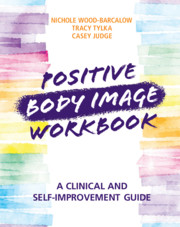Book contents
- Positive Body Image Workbook
- Positive Body Image Workbook
- Copyright page
- Contents
- Foreword
- Acknowledgments
- Section I Introduction and Preparation
- Section II The Journey Toward Positive Body Image
- Chapter 4 Appearance Ideals and Media Literacy
- Chapter 5 Weight Stigma versus Weight Inclusivity
- Chapter 6 Body Acceptance by Others
- Chapter 7 Defining Beauty and Cultural Pride
- Chapter 8 Self-Compassion and Body Image Flexibility
- Chapter 9 Approaching Our Bodies
- Chapter 10 Body Appreciation
- Chapter 11 Functionality Appreciation
- Chapter 12 Embodiment
- Chapter 13 Objectification and Self-Objectification
- Chapter 14 Sexual Intimacy
- Chapter 15 Social Comparison
- Chapter 16 Body Talk
- Chapter 17 Protective Filtering
- Chapter 18 Rippling Effect: Mentorship
- Chapter 19 Self-Care
- Chapter 20 Fueling Our Bodies
- Chapter 21 Life-Enhancing Movement
- Chapter 22 Adaptive Appearance Investment and Quality of Life
- Section III Continuing Our Journeys
- Index
- References
Chapter 8 - Self-Compassion and Body Image Flexibility
from Section II - The Journey Toward Positive Body Image
Published online by Cambridge University Press: 02 February 2021
- Positive Body Image Workbook
- Positive Body Image Workbook
- Copyright page
- Contents
- Foreword
- Acknowledgments
- Section I Introduction and Preparation
- Section II The Journey Toward Positive Body Image
- Chapter 4 Appearance Ideals and Media Literacy
- Chapter 5 Weight Stigma versus Weight Inclusivity
- Chapter 6 Body Acceptance by Others
- Chapter 7 Defining Beauty and Cultural Pride
- Chapter 8 Self-Compassion and Body Image Flexibility
- Chapter 9 Approaching Our Bodies
- Chapter 10 Body Appreciation
- Chapter 11 Functionality Appreciation
- Chapter 12 Embodiment
- Chapter 13 Objectification and Self-Objectification
- Chapter 14 Sexual Intimacy
- Chapter 15 Social Comparison
- Chapter 16 Body Talk
- Chapter 17 Protective Filtering
- Chapter 18 Rippling Effect: Mentorship
- Chapter 19 Self-Care
- Chapter 20 Fueling Our Bodies
- Chapter 21 Life-Enhancing Movement
- Chapter 22 Adaptive Appearance Investment and Quality of Life
- Section III Continuing Our Journeys
- Index
- References
Summary
When we are faced with difficult situations in which we suffer, fail, or feel inadequate, how do we respond? Do we criticize ourselves, obsess about what we did wrong, and distract ourselves from our feelings (such as shame, guilt, or pain)? We may even believe that we “deserve” treating ourselves this way, like it is “tough love” so we will “be better” in the future. However, treating ourselves this way can be damaging and ineffective. In fact, beating ourselves up during and after difficult situations moves us further away from our goals.
- Type
- Chapter
- Information
- Positive Body Image WorkbookA Clinical and Self-Improvement Guide, pp. 118 - 132Publisher: Cambridge University PressPrint publication year: 2021



